

Reg HKLM\SOFTWARE\Microsoft\Windows HKLM\SOFTWARE\Microsoft\Windows 15įile C:\ProgramData\Microsoft\Search\Data\Applications\Windows\MSS0BD69.log 131072 bytesįile C:\ProgramData\Microsoft\Search\Data\Applications\Windows\MSS0BD6A.log 131072 bytesįile C:\ProgramData\Microsoft\Search\Data\Applications\Windows\MSS0BD6B.log 131072 bytesįile C:\ProgramData\Microsoft\Search\Data\Applications\Windows\MSS0BD6C.log 131072 bytesįile C:\ProgramData\Microsoft\Search\Data\Applications\Windows\MSS0BD6D.log 131072 bytesįile C:\ProgramData\Microsoft\Search\Data\Applications\Windows\MSS0BD6E.log 131072 bytesįile C:\ProgramData\Microsoft\Search\Data\Applications\Windows\MSS0BD6F.log 131072 bytesįile C:\Users\Owner\AppData\Local\Microsoft\Windows\Temporary Internet Files\Content.IE5\FCA9H8D1\errorPageStrings 0 bytesįile C:\Users\Owner\AppData\Local\Microsoft\Windows\Temporary Internet Files\Content.IE5\FCA9H8D1\background_gradient 0 bytesįile C:\Users\Owner\AppData\Local\Microsoft\Windows\Temporary Internet Files\Content.IE5\FCA9H8D1\down 0 bytesįile C:\Users\Owner\AppData\Local\Microsoft\Windows\Temporary Internet Files\Content.IE5\FCA9H8D1\httpErrorPagesScripts 0 bytes Reg HKLM\SOFTWARE\Microsoft\Windows 10000 Reg HKLM\SOFTWARE\Microsoft\Windows IconCodecService.dll

Reg HKLM\SYSTEM\ControlSet003\Services\sptd\Cfg\14919EA49A8F3B4AA3CF1058D9A64CEC (not active ControlSet) Reg HKLM\SYSTEM\CurrentControlSet\Services\sptd\Cfg\14919EA49A8F3B4AA3CF1058D9A64CEC Running: 5moe4weg.exe Driver: C:\Users\Owner\AppData\Local\Temp\uwtdypog.sys
#Xnviewmp .079 safe windows#
Windows Service Pack 2 Harddisk0\DR0 -> \Device\Ide\IdeDeviceP1T0L0-2 WDC_WD1600BEVS-22RST0 rev.04.01G04 Rkill stops it for about 15 minutes, then it starts it's effects again. It's currently also understudying combination with pomalidomide.Hijacked Firefox on Google searches, WindowsRepair keeps popping up (looks like a virus scan), some process keeps playing some online radio, warnings keep popping up about disk drive failure, keeps hiding all files.
#Xnviewmp .079 safe trial#
So, this trial is continuing to accrue patients and also exploring combinations with this regimen, given the very favorable hematologic toxicity profile.
:max_bytes(150000):strip_icc()/61b9B4EYs7L._AC_SL1500_-41aa6d3990b4456fbdb4cc079a7d4050.jpg)
So the other notable fact now that this trial has been going on that we've seen durability of responses with several patients being on therapy beyond 12 months, and also response is deepening over time, including the patient developing MRD negative disease by cycle 13. And if you look at anti-CD38 naive patients that were responsive at the 600 mg dose, which is the chosen dose moving forward, the overall response rate was 36%, which is very comparable to the response rates with single agent daratumumab in some of the early initial studies. So once we reached the target saturation dose, we saw an overall response rate of 28%. And looking at outcomes, we also saw some favorable outcomes in terms of response rates. No significant lymphopenia or thrombocytopenia. Very rare, mild injection site reactions. In terms of safety, we saw that this drug was very well tolerated. And that 65% with double refractory to both an IMiD and a PAI. Also notable, was that 25% of them had had prior anti-CD38 antibody. Of note, 82% of these patients had prior STEM cell transplant.
#Xnviewmp .079 safe update#
The update at ASCO reported on a total of 41 patients. And bi-weekly cycles, three to six, and then monthly cycles seven and beyond. Given in a traditional fashion, similar to other anti-CD38 antibodies weekly for two cycles.

The trial that was reported on it at ASCO was a phase Ib trial, a dose escalation starting at 45mg going up to 1,800mg as the planned maximum dose. So theoretically, therefore, it could cause less off target side effects, notably in terms of cytopenias. So TAK-079 is an anti-CD38 antibody that is unique in the sense that it has a high bioavailability for the target cell, the plasma cell, and less binding to red blood cells. This was a poster presentation and updated results that were presented at the ASH meeting last year, now including more patients with longer followup. Following is a transcript of her remarks :


 0 kommentar(er)
0 kommentar(er)
